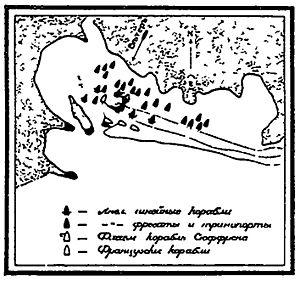Battle of Pondicherry facts for kids
Quick facts for kids Battle of Pondicherry |
|||||||
|---|---|---|---|---|---|---|---|
| Part of the Seven Years' War | |||||||
 Battle of Pondicherry |
|||||||
|
|||||||
| Belligerents | |||||||
| Commanders and leaders | |||||||
| Strength | |||||||
| 9 ships of the line 1 frigate |
11 ships of the line 2 frigates |
||||||
| Casualties and losses | |||||||
| 184 killed 385 wounded |
1,500 killed or wounded | ||||||
The Battle of Pondicherry was a naval battle fought on September 10, 1759. It took place off the coast of India, near a city called Pondicherry. This battle was part of a bigger conflict known as the Seven Years' War.
The fight was between the British navy, led by Vice-Admiral George Pocock, and the French navy, led by Comte d'Aché. The British wanted to stop the French ships. These French ships were bringing important supplies like soldiers and money to their forces in Pondicherry.
The battle ended without a clear winner, which is called indecisive. However, the French fleet successfully reached Pondicherry on September 15. This meant they completed their mission. Even so, the supplies they brought were not enough to change the war's direction for France in India.
What Happened After the Battle?
Even though the battle didn't have a clear winner, the French ships were not destroyed. They all made it safely to Pondicherry. This allowed them to deliver the much-needed supplies. Because of this, some people see it as a small victory for the French. They achieved their main goal.
The French convoy brought a lot of money to help their war efforts. But the number of new soldiers was too small. It wasn't enough to challenge Britain's growing power in India.
The French governor-general, Comte de Lally, also had problems. He did not like the local Indian people. He refused to use Indian soldiers, called sepoys, to make his army stronger. The British, however, used many sepoys, which gave them an advantage.
By 1759, the war in India was starting to favor Britain. But the final outcome was still uncertain. As the war continued, Britain's strength grew. They received more soldiers from home. They also recruited many local sepoys.
From 1760 onwards, Britain began to take back land they had lost. They started a siege of Pondicherry in March 1760. A siege is when an army surrounds a city to try and capture it. The city defended itself bravely for a long time. But it finally fell to the British on January 15, 1761.
Pondicherry stayed under British control for a few years. It was returned to France in 1763. This happened when the Treaty of Paris was signed. This treaty officially ended the Seven Years' War.
 | Percy Lavon Julian |
 | Katherine Johnson |
 | George Washington Carver |
 | Annie Easley |

